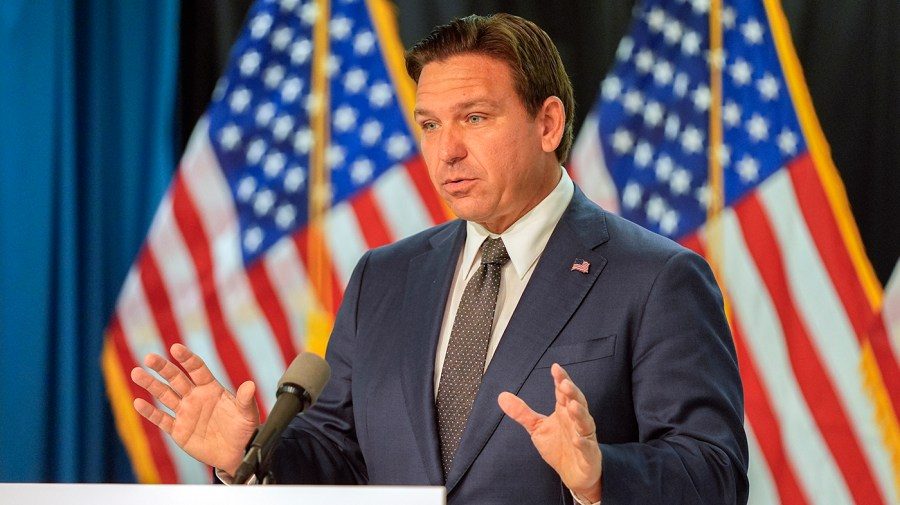The campaign to pass a ballot measure enshrining abortion rights in Florida’s Constitution has raked in cash in recent months, giving it a massive financial advantage over the opposition with days until votes are counted.
But abortion-rights advocates are running into a political buzz saw as Florida Gov. Ron DeSantis (R) and his allies in the administration deploy levers of government power to try to stop the amendment from passing.
Backers of the amendment say DeSantis’s heavy-handed efforts are a brazen misuse of taxpayer funds and show just how high the stakes are in the state, where a law signed last year makes abortion illegal after about six weeks.
The political group Floridians Protecting Freedom has raised more than $100 million for the measure since it launched in April 2023, including $17.2 million in a single week in early October.
The political committee launched by DeSantis to oppose the measure has raised only about $6.3 million total.
Ten states are voting on abortion amendments this year. Opposition to abortion-rights ballot initiatives from conservative state lawmakers and activists has been a hallmark of this election cycle.
But supporters of Florida’s amendment said what’s been happening in their state is different.
“What we are seeing is an incredible pushback from our government in terms of just our freedom to have a free and fair election,” said Bacardi Jackson, executive director of the American Civil Liberties Union of Florida.
Chris Melody Fields Figueredo, executive director of the Ballot Initiative Strategy Center, said there has been a steady increase in efforts “to undermine the will of the people” and sabotage progressive ballot measures over the last few years.
“What’s happening in Florida this year is definitely unprecedented. And I would say non-stop,” Fields Figueredo said.
In Florida, ballot measures must undergo a review by the state Supreme Court. The DeSantis administration unsuccessfully argued earlier this year to stop the measure from qualifying for the ballot.
In recent weeks, the opposition has gone all in. And it may be working. Support for the amendment has fallen in recent months, with most polls showing it just short of the 60 percent threshold needed. A poll at the end of July had it at 69 percent.
A Republican-controlled state panel added a financial statement beneath the question on the November ballot, stating that the amendment could cost the state money because of lawsuits.
Then last month, the state agency in charge of running Florida’s Medicaid program launched a website attacking the amendment. At least three public agencies have aired television and radio ads against the measure.
The state Department of Health threatened local television stations that had run an ad supporting the amendment, and a state election police unit visited residents’ homes as part of a fraud investigation into the signature-gathering process months after the measure was approved.
“The reality is that we’re seeing taxpayer dollars weaponized against us right now,” said Lauren Brenzel, campaign director for Yes on 4.
“We don’t know what state resources are being wasted on this campaign, so we’re not getting too comfortable at any moment,” she added. “Right now, unfortunately, as a taxpayer in Florida, we’re all funding an attempt to try to keep Florida’s extreme abortion ban in place.”
Kelly Hall, executive director of the Fairness Project, said the $100 million raised by the “yes” campaign may seem like a lot, but much of the early spending went to ensuring the measure made it onto the ballot.
“I don’t want the narrative that our campaigns are awash in cash to be the impression across the map,” Hall said. “You often see higher fundraising numbers from our proactive campaigns that our opponents do not have to spend, especially when it is taxpayer funded elected officials who are leading the charge so often on trying to keep us off the ballot or battling against us on the airwaves.”
Hall also noted Florida is the most populous state with an abortion ballot amendment this year. The “yes” campaign is spending far less per registered voter than those in smaller states like Montana or Nebraska, she said.
DeSantis has been crisscrossing the state this week with a group of anti-abortion doctors to campaign against the amendment. He’s called it fraudulent and a bait-and-switch that would allow abortion up until birth.
During a rally in Jacksonville on Tuesday, he said the state Supreme Court made a “mistake” by allowing it on the ballot.
“The whole idea is to try to jam this through with a blizzard of lies,” DeSantis said. “And these are things you don’t get a mulligan on. Once it’s in the constitution, there really is no going back.”
DeSantis signed the six-week ban into law just before he launched his failed presidential campaign. Progressives and Republicans speculated the governor is likely eyeing another national campaign and needs to reassert his authority in the state.
“Amendment 4 flies in the face of the DeSantis agenda,” Fields Figueredo said. “That’s really what is at stake here.”
A Florida GOP strategist said it’s important for DeSantis to show conservatives he fought for a hard-line anti-abortion position.
“Obviously, if he’s able to make this stand, and he wants to run for president, he’s going to gain a big chip with pro-life allies,” the strategist said.
“But also, if you’re the governor of the state and you want to be seen as being effective, you certainly don’t want to be slapped down for something that you’ve worked hard for since the Supreme Court struck down Roe v. Wade. I don’t think any governor wants to be told no.”

